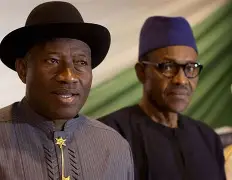The former president recalls the sect’s surprising choice during his administration’s efforts to engage in dialogue.
Former President Goodluck Jonathan has revealed that Boko Haram insurgents once nominated ex-President Muhammadu Buhari to represent them in peace talks with the Federal Government.
Jonathan made this disclosure on Friday during the public presentation of Scars, a book authored by former Chief of Defence Staff Gen. Lucky Irabor (retd.), in Abuja.
According to Jonathan, his administration had set up several committees to explore dialogue with the sect, and in one such instance, the insurgents named Buhari—then an opposition figure—as their preferred negotiator.
READ ALSO: 10Years After, Rescued Chibok Girls Set To Graduate From University
“One of the committees we established at that time was nominated by Boko Haram to have Buhari lead their team in negotiations with the government. So I was feeling that, oh, if they nominated Buhari to represent them and have a discussion with the government committee, then when Buhari took over, it could have been an easy way to negotiate with them, and they would have handed over their guns. But it was still there until today,” Jonathan said.
The former president explained that Buhari’s inability to end the insurgency during his eight-year tenure showed that the crisis was far more complex than often portrayed. He noted that Boko Haram’s persistence was evidence that the conflict could not be reduced to issues of poverty or hunger alone.
Jonathan, who served as president between 2010 and 2015, described Boko Haram as “a multifaceted problem” that required unconventional approaches. He urged the current administration to adopt a carrot-and-stick strategy, warning that the group’s access to sophisticated weapons pointed to external support.
“If you look at the weapons they use, and you value the weapons, then you know that these are not hungry people. Sometimes they even have more ammunition than our soldiers. Where are these guns and sophisticated weapons coming from?” he asked.
READ ALSO: 21 Abducted Chibok Girls Returned With 34 Children, Trauma Killed 48 Of Their Parents – Report
‘A Scar I Will Die ’With’—Jonathan Reflects On Chibok Tragedy
The former president also recalled the abduction of over 200 Chibok schoolgirls in 2014, which he described as “a scar” on his administration that he would “die with.” He expressed hope that, in the future, some Boko Haram leaders might document their motives and actions, much like actors of the Nigerian Civil War did, to provide clearer historical context.
Jonathan further stressed the importance of documentation by military leaders and policymakers, commending Irabor for publishing his account of Nigeria’s battle against insurgency.
READ ALSO: Rescued Niger Women Fell In Love In Captivity, Vow To Rejoin Terrorist ‘Husbands’
Boko Haram, which originated in Borno State in the early 2000s, became a major threat after its founder, Mohammed Yusuf, was killed in police custody in 2009.
In 2012, at the height of the insurgency, reports emerged that the sect named Buhari among respected northern leaders they trusted to mediate peace. Buhari, however, rejected the nomination, accusing Jonathan’s government of attempting to drag him into the crisis for political reasons.
Despite successive administrations’ military campaigns, Boko Haram remains active across the Northeast, continuing attacks on civilians and security forces.

